 |
Fand, Celtic Goddess of the Sea,
soaking up the rays |
Dialect, "a particular form of a language specific to a certain region or group" as one dictionary has it, can be an alluring facet for writing a fictional work. It can lend an air of greater embedment in the unfolding of a tale, an immediacy of being among, or of the characters, instead of hearing a more grammatical narrator speaking in his own voice to give a report of dialog between story characters--which is effectively a translation of their dialect, and perhaps, as translations do, loses some of the native emotive content.
A character in a short story I wrote some years ago was a young, partially-disabled vet, working on a produce farm alongside migrant farm workers from out-of-state. They were black, and he was white. The migrants had a rich, rural southern, dialect, and the vet had a northern, lower working class, dialect. A lot of the story included raucous episodes the migrant workers lied and joked about during their long hours of creeping forward on the soil beds, harvesting the vegetables as they went. I wrote the story using a voice and idioms of other farm migrants I had worked alongside, part-time, for several years as a teenager. I then rewrote the story in a third-person limited POV, using proper, grammatical diction. I thought the dialect version seemed richer, but they're still just drafts.
I was thinking about the pros and cons of using dialect as I read
Foreign Gods, Inc., by Oke Ndibe, a Nigerian-born writer who also teaches African and African Diaspora literatures here in the US. The theme of the story involves a Nigerian immigrant to the US who earned an economics degree here, but had been unsuccessful in landing a job in his field. After hearing more than enough criticisms of his
accent, Ike has given up pursuing that career path, and has been driving a taxi for thirteen years. Reading an article about a dealer in foreign gods in his resident city of NY, he visits the establishment, Foreign Gods, Inc. He proposes to sell them an ancient war deity from his village in Nigeria, but the dealer is reluctant to estimate any potential value until he can inspect the actual piece, and sees some documents or publications attesting to the provenance of the deity. Ike borrows from friends and maxes out his credit card to make the trip back to his village in Nigeria.
A major part of the story following includes a Nigerian dialect, incorporating a sort of local, pidgin English. Often it results in very humorous mashups of Nigerian and American diction. In the story, Ike has neglected for some time, because of a gambling addiction developed back in the US, to send any money for his mother and sister. Now he's come back to rob the village of their deity, Ngene. Wouldn't matter to the mother and sister, since they, with a large portion of the village, have fallen for the new allure of the Christian gospel as promulgated by a slick, duplicitous local minister. He had viewed Ike as a probable easy American mark for $50K to build him a new church. There's a comical, if a little unsettling, bible belt preacher vs. smug religious cynic sort of opera going on here, but it holds together well enough. The tension created by Ike's need to purloin the deity from a sort of Elk's Lodge temple, presided over by Ngene's high priest, Ike's beloved uncle, is almost palpably painful.
I would say that Ndibe has written a pretty good story, but I found his extensive use of such an idiosyncratic dialect wore me down a bit in the reading.
 I was saddened to learn of the death of children’s author Georgess McHargue on Monday, July 18th. It seems that this was a death our community missed and I am sorry for it. Ms. McHargue penned many a fine children’s novel, but my favorite would have to be Stoneflight, a tale of New York City’s statuary come to life. According to her obituary, “After working at Golden Press, Georgess became an editor at Doubleday. In her long career as an author, she published 35 books, many are for young adults, some focused on archaeology, mythology and history. She was nominated for a National Book Award for The Beasts of Never, and wrote many reviews over the years for the NY Times Book Review.” Jane Yolen was a friend of hers and alerted me to her passing. Thank you, Jane, for letting us know. She was a brilliant writer.
I was saddened to learn of the death of children’s author Georgess McHargue on Monday, July 18th. It seems that this was a death our community missed and I am sorry for it. Ms. McHargue penned many a fine children’s novel, but my favorite would have to be Stoneflight, a tale of New York City’s statuary come to life. According to her obituary, “After working at Golden Press, Georgess became an editor at Doubleday. In her long career as an author, she published 35 books, many are for young adults, some focused on archaeology, mythology and history. She was nominated for a National Book Award for The Beasts of Never, and wrote many reviews over the years for the NY Times Book Review.” Jane Yolen was a friend of hers and alerted me to her passing. Thank you, Jane, for letting us know. She was a brilliant writer.
- Diane Roback, now I doff my hat to you. The recent PW article on Colorful Characters is a boon to the industry. I dare say it’s brilliant. One does wonder how Walter Mayes, who is not old, feels about being included amongst the dead and elderly. I hope he enjoys it! Being known as a “colorful character” will keep folks talking about you (and writing about you) for decades to come.
- That’s cool. Zetta Elliott had a chance to interview and profile Jacqueline Woodson in Ms. Magazine’s blog recently. Good title too: Writing Children’s Books While Black and Feminist. The part where she’s asked to name “five other black LGBTQ authors of children’s literature” is telling. I don’t know that I could either.
- Living as we do in an essentially disposable society, Dan Blank’s piece on Preserving Your Legacy: Backing Up Your Digital Media makes for necessary reading. As someone who has lost countless photos and files through my own negligence, this piece rings true to me. Particularly the part where Dan says he makes sure that “Once a day, I backup my photo library onto an external hard drive.” Anthony Horowitz once told me the same thing. How’s THAT for name dropping, eh eh?
- Jobs! Jobs in the publishing industry! Jobs I say!
- And much along the same lines, were you aware that there’s a group out there made up entirely of youngsters who are entering the publishing industry? At 33 I reserve the right to call twenty-somethings “youngsters”. I am also allowed to shake my cane at them and use phrases like “whippersnappers” and “hooligans”. But I digress. The Children’s Book Council has an Early Career Committee
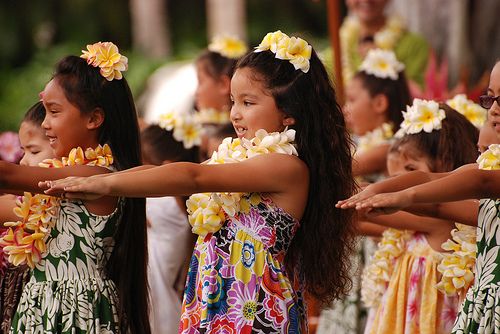
In Hawai'i, children and sweethearts are also referred to as "lei." (photo: Makena G.)
Wow. Seems like I just wished you a "Happy Lei Day," and now the month of May is coming to an end.
Just in case you're cruising by on this long weekend, thought I'd serve up a little snack. Here are several pics from this year's Lei Day Festival in Hawai'i. They had their usual lei making contest at Kapiolani Park on Oahu, and I must say how impressed I am with the high level of artistry and creativity displayed in the entries.
I may be just a tad biased, but I do think Hawai'i has the best lei artisans in the world, when you consider the variety of materials used (flowers, seeds, leaves, pods, vines, shells, fronds), and the various techniques employed (weaving, tying, sewing, twisting, knotting). The result -- a blend of color, texture and composition that is simply breathtaking!
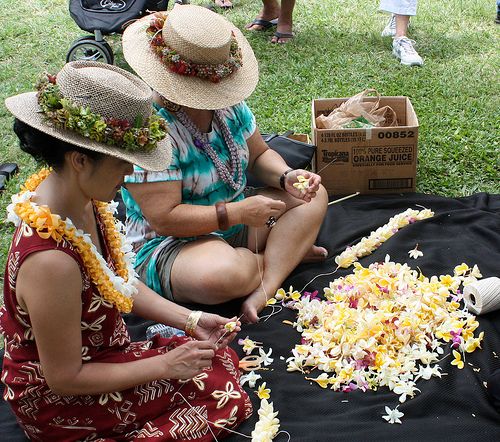
photo: U Jay.
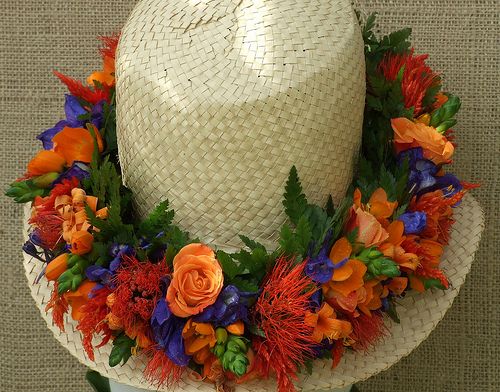
Lei Hat Division Winner photo by colleeninhawaii.
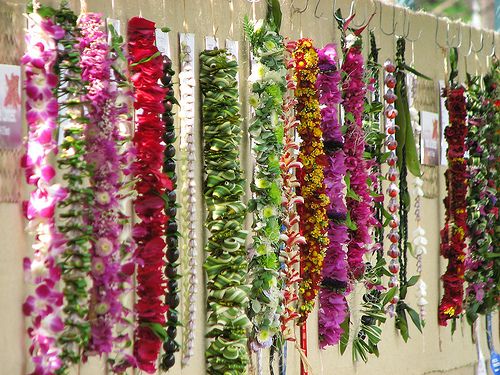

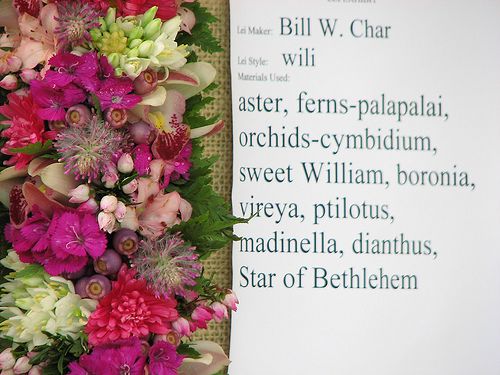
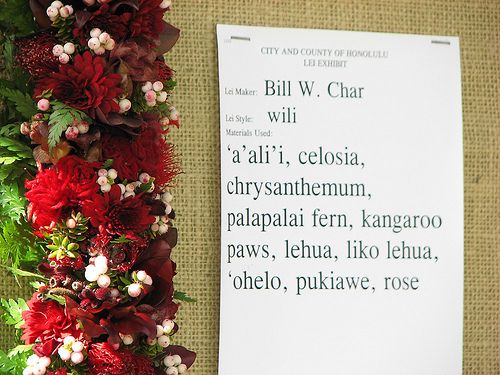
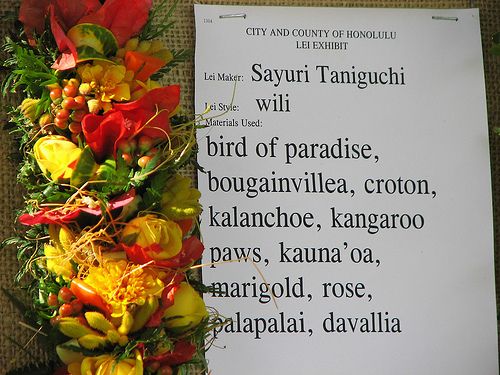
Above five photos from My PHOTOlulu's photostream.
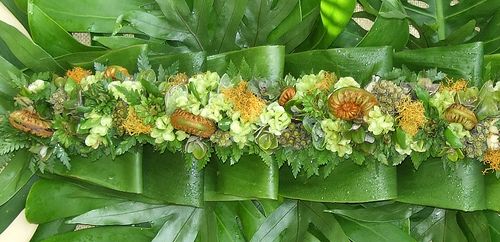
Mayor's Grand Prize Lei Winner photo by colleeninhawaii.
When I was little, I remember we were asked to bring a simple plumeria lei to school for Memorial Day. These were collected and taken to Punchbowl or other cemeteries to adorn plaques and headstones. Today, whenever a large quantity of leis is made for either Lei Day or Aloha Week, etc., they are often taken to the cemeteries after the event is over -- a perfect way to "recycle" them.
I also wanted to share this short video with you about Pidgin (Hawai'i Creole English). I've blogged a little about it before, but this will give you a better idea of what it sounds like, how it originated, and why it's the "glue" that binds all the different ethnic groups together. It's pretty cool when you think about it -- a unique language that evolved out of sheer necessity, used right alongside standard English in the Islands.
O
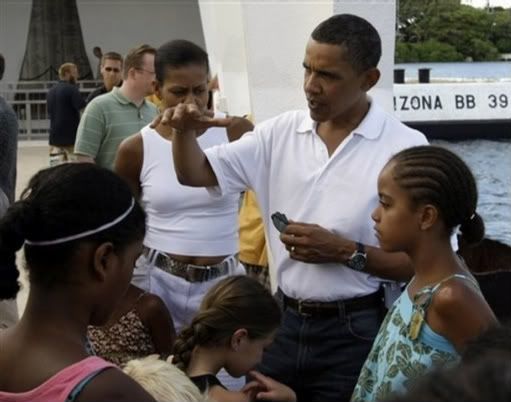
The Obamas visiting the U.S.S. Arizona last year.
So, the past few days I've been wondering something.
When orator extraordinaire Barack Obama is in Hawai'i, does he ever speak any Pidgin? I mean, can you imagine him saying something like:
Ho, dis haupia cake broke da mout!
We go holoholo bumbai.
No can.
It's hard to imagine, but I tend to think he must speak some Pidgin when he's with old friends. I haven't lived in Hawai'i for 30+ years, and I never speak Pidgin here in Virginia, yet whenever I'm back home visiting family and friends, I naturally begin to shorten my phrases and assume that unmistakable Pidgin "accent." It's in my DNA, and I think it's in Barack's, too. Len wholly disagrees, citing that Barack is too conscious of his public image to utter so much as a syllable in Pidgin, since the press would pick up on every word he says.
Like Pidgin is bad, or something? Not so.
Pidgin, or Hawai'i Creole English (not to be confused with the Hawaiian language), is spoken by most of the local population. If ever a common language anywhere had the power to both characterize and continually unify an ethnically diverse society, Hawaiian Pidgin is it. Dynamic, energizing, colorful, varied and sassy, this homegrown style of talk has persisted in the islands for over 200 years, despite organized efforts to suppress it.
Pidgin evolved out of sheer necessity as outsiders arrived in the islands, from early English traders to New England missionaries to plantation workers from such countries as China, Portugal, Japan, Korea, and the Philippines. Each group brought its own words, idioms, rhythmic speech patterns and grammatical idiosyncrasies to bear upon a shortened form of Standard English, thereby facilitating communication.
You lolo o' wat?
Going get plenny kaukau.
Dat guy wen kakaroach me!
In short, Pidgin cut to the chase, and enabled a lot of people, living in a small place, to get along. It continues to evolve today, even blending elements of contemporary slang, as the need arises.
Mosh mosh!
Dis ting stay kapakahi.
Eh, no wear yo rubbah slippahs in da house.
Although Hawai'i Creole English (HCE) embodies the very identity of island residents, there is lingering ambivalence over its use. Some view it as inferior broken English, saying those who speak it are deficient in some way and that it impedes mastery of Standard English in children.
Thanks to the efforts of ESL educators and the use of Pidgin in poetry, songs, essays, and plays in the last few decades, HCE is now recognized as a distinct language -- not a substitute for Standard English, by any means, but a language that honors cultural identity. It's definitely here to stay, and it reflects the inestimable value Hawaiians have always placed on inclusion, cooperation, and finding common ground. Moreover, it's totally non-hierarchical, the great equalizer that cuts across race, gender, and socio-economic class.
Sounds like Barack, no?
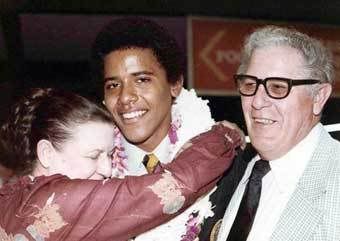
No doubt Barack heard and spoke Pidgin to some degree while growing up. He might not speak much of it now, but it certainly enabled him, in his formative years, to communicate with and understand people from many different cultures, and to value their differences. As Michelle said, "In order to understand Barack, you have to understand Hawai'i." And, in order to fully understand Hawai'i, it helps to know Pidgin, or at the very least, to recognize the crucial role this particular language has played in its social history.

So, I'm still having fun imagining Barack hanging out with his old Punahou school buddies and talking story about the old days. Wouldn't some linguistic flavor from the past subconsciously emerge?
Instead of, "Shall we get a bite to eat?", might he say, "Eh, you guys like go Rainbow Drive Inn?" Or, would he say, "Dat buggah was wrong, man," instead of, "I've never agreed with Bush's decision to invade Iraq."
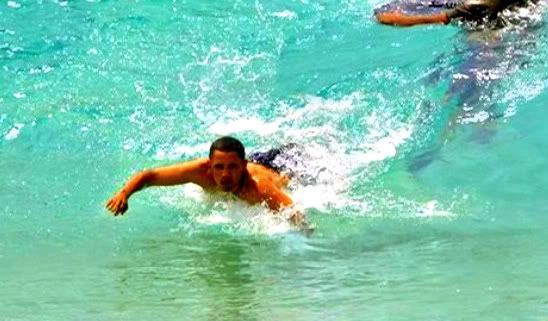
No, no, maybe not. He's polished his official image so perfectly that it's really hard imagining him relaxing his speech. Yes, but he is the most accessible President, the most down to earth we've had so far. No, I can't decide, though I know he'd never say, "No can." What do you think?
Now, if I could just figure out why he always says "tuh," instead of "to!"
Like learn mo' ?
Da Kine Dictionary, compiled and edited by Lee A. Tonouchi (Bess Press, 2005). Essential Pidgin expressions and terms, sentence examples, and colorful photos showing local people in funny-kine poses.
Pidgin Grammar: An Introduction to the Creole Language of Hawai'i, by Kent Sakoda and Jeff Siegel (Bess Press, 2003). Details origins and uses, pronunciation, writing system, word classes, phrases and types of sentences. Puts to rest the idea that Pidgin is merely a form of broken English without a structure.
Pidgin to the Max: 25th Anniversary Edition, by Kent Sakata and Pat Sasaki (Bess Press, 2005). Simply hilarious, with situational cartoon drawings. A classic, and essential for anyone who seeks true insight into local Hawaiian culture.
Da Jesus Book: Hawai'i Pidgin New Testament (Wycliff Bible Translators, 2000). And they said it couldn't be done!
Da links:
Position Paper by Da Pidgin Coup (University of Hawai'i). Discusses the role of Pidgin in education, and the complex relationship between Pidgin and English.
How to Talk Conversational Pidgin: a list of common expressions, their definitions, and audio files on pronunciation. A great primer.
Check out this video to hear a short conversation about Gabby Pahinui, slack key guitar pioneer. Hearing them talk, I feel like I know these guys, even if I don't. The power of pidgin makes me feel like I'm home.

Pidgin phrases in this post:
My goodness, this coconut pudding cake is delicious!
Let's go out (cruising) later.
That's impossible.
Are you crazy?
There's going to be lots of food.
That man cheated (robbed) me!
Shortened form of moshi moshi (Japanese for "hello" when answering the phone)
This is all mixed up (upside down, backwards).
Excuse me, please don't wear your flip flops indoors.
Tanks, eh?



















Quick correction: Georgess McHargue got her NBA nomination for THE IMPOSSIBLE PEOPLE, not THE BEASTS OF NEVER.
Wow. Now that I know I was being manipulated by a “band of hippie hammer-lovers” or imperialist loving trains I don’t think I’ll look back on my son’s early childhood the same again. Although honestly, he just loved the trains and talking construction vehicles. Is that sooooo bad???
Good catch, Peter! And bad show, oh obituary writer.
Colleen, I think you’re in the clear. Unless you son starts colonizing other kids’ sandboxes “for their own good”. Then at least you know who to blame.
I am absolutely thrilled to be a Colorful Character and honored to be among such greats!
Love the Children’s Book Council Harry Potter link! I am totally going to name a local trivia team That’s So Ravenclaw, if the originators wouldn’t mind.
(And as I’m headed to The Wizarding World of Harry Potter at Universal Studios this weekend, I’ll look for a chance to use the phrase.)
Love the minimalist posters, especially the ones for The Princess and the Pea and The Wizard of Oz (though it was missing ‘home’). Thanks for the link.
Is that Spinelli cover supposed to be about a boy and his older triplet brothers? Or did the illustrator have only the one model and not enough imagination to change somebody’s hair color?
Thanks so much for mentioning my post. I’m thrilled! And that cover is obviously a young Henry Winkler, dreaming of being the Fonz.
Elliott posted the full and unedited interview with Woodson in two parts on her blog. Its a must read if you like the profile in Ms. Magazine
Speaking of youngsters to publishing, the AAP has been sponsoring the Young to Publishing Group for 10 years now! I really enjoyed it when I was a newly minted editorial assistant in New York in the early 2000s and hopefully it’s still helpful for other newbies. Check it out at: http://youngtopublishing.com/
You might appreciate today’s drawing lesson on how to draw bunnies: http://www.guardian.co.uk/books/gallery/2011/aug/02/how-to-draw-bunnies-simone-lia
(and note that Simone Lia, as well as Oliver Jeffers in his post (Same series) on how to draw penguins…. both compare various appendages to sausages). Ah, the UK. Not sure our american illustrators would use the same analogy.